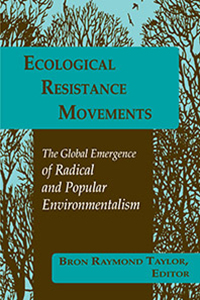ECOLOGICAL RESISTANCE MOVEMENTS:
THE GLOBAL EMERGENCE OF RADICAL
AND POPULAR ENVIRONMENTALISM
REVIEWS
Reviews of Ecological Resistance Movements are listed below, followed by excerpts from them. Because the review in Mobilization provides an excellent summary of the volume and its arguments, I have provided the entire review, and lead with it.
- The [London] Times Literary Supplement, p. 15, 8 September 1995.
- The Trumpeter 12(4):201-03, by Bill Devall, Fall 1995.
- Future Survey 18(3):10, March 1996.
- Choice (Science and Technology) 33(8), by J.S. Schwartz, April 1996.
- World Rainforest Report, p. 24-25, by Thomas Harding, June 1996.
- Capitalism, Nature, Socialism 7(4):154, by Roger Gottlieb, December 1996.
- Environmental History 1(3):103-104, by Jan Laarman, July 1996.
- American Political Science Review 90(4):957-58, by Robert Paelke, December 1996.
- Viewpoints: 1996-1997 Annual Edition, p. 107, by Mark Peterson.
- Wild Earth, p. 96-97, David Johns, Winter 1996/97.
- Mobilization: An International Journal of Research and Theory about Social Movements and Collective Behavior 2(1):118-119, by Stella Capek, March 1997.
- Worldviews: Environment, Nature, Culture 1(1):90-92, by Anna Peterson, April 1997.
- Environmental Ethics 21(1): 97-100, by Randall Auxier, Spring 1999.
Reviews & Review Excerpts -- Fall 1995 to Spring 1999
Stella Capek in Mobilization 2(1):118-119, March 1997
This edited volume on global “ecological resistance movements” is one of a growing number of recent books on environmental movements that should prove useful to social movement scholars. The book is interdisciplinary as is the background of the editor (Taylor is Associate Professor of Religion and Social Ethics and director of Environmental Studies at the University of Wisconsin, Oshkosh). It combines a variety of case studies, discourses, and theoretical reflections, and poses itself the difficult task of finding coherent patterns across a range of global grassroots environmental movements. Given the stunning variety of local movements and cultural assumptions framing them, making analytical sense of such movements can not be a neat or finished task. The book reflects this reality, yet takes a significant step forward in suggesting common patterns and contributing to an interdisciplinary understanding of the movements.
Even the term “popular ecological resistance movements” is problematic, as Taylor acknowledges in his introduction: it does, however, capture the grassroots nature of the movements, their often radical quality, and their link to an environmental sensibility that takes many different cultural forms. By proposing a reasonably inclusive term, Taylor and the authors in this volume push social movement analysis in a global direction, a move wholly consistent with the recent interest in transnational movements. Taylor lays out four lines of inquiry for the book: (1) a “descriptive tour of ecological resistance” (focusing on the Americas, Asia and the Pacific, Africa, and Europe); (2) “ecological resistance and social-movement theory;” (3) “the challenges of” and (4) “the impacts and prospects of ecological resistance movements.” The book includes thirteen case studies, some of which focus on a particular country or region (for example, Vikram Akula’s “Grassroots Environmental Resistance in India,” or Ben Wisner’s “Luta, Livelihood, and Lifeworld in Contemporary Africa”). Others incorporate a comparative global perspective within one chapter (for example, Al Gedicks’s chapter on native resistance and the new resource wars). In a concluding section of the book, five chapters offer selected reflections on the movements. The reader encounters a wide variety of theoretical concerns, including sociological social movement analysis, a philosophical focus on ethics and postmodernity, a religious focus on the significance of Anthropocentrism and the role of the sacred, and a political concern with radical versus reformist movements.
This is a tall order. Achieving coherence in a book that combines so many discourses is a difficult, perhaps impossible, task. At the very least, it challenges the reader to transcend disciplinary boundaries. For example, social movement scholars accustomed to sociological frameworks will feel at home in Bob Edwards’ chapter on grassroots environmentalism in the United States, but will perhaps find chapters such as Daniel Deudney’s “In Search of Gaian Politics: Earth Religion’s Challenge to Modern Western Civilization” conceptually and substantively far afield from their usual concerns. This is not an argument against producing an interdisciplinary book. On the contrary, we need such efforts to advance our understanding of global environmental movements. The wide range in thematic content and approaches, however, produces an impression of uneveness. Some will be put off by the book’s collage-like quality, while others will find this appealing.
This being said, the book makes at least four important contributions: it documents significant new cases, it sharpens the theoretical debates surrounding environmental movements, it debunks ethnocentric concepts that are inappropriate for global analysis, and it seeks to generalize about social patterns at the global level.
Regarding the first point, the case studies (although theoretically framed in a variety of ways and uneven in the depth of empirical detail) serve an important documentary function. Students and others will find this volume -- with extensive explanatory notes appended to each chapter -- to be an important sourcebook on global environmental movements. Second, the book helps to sharpen theoretical debates surrounding environmental movements: for example, what does it mean to say, “African environmentalism?” What is the relationship between postmodernity and “deep ecology?” What do we mean by “radical” environmentalism? Environmentalism in Thailand debunks Western assumptions about the analytical importance of dichotomies such as state/market and anthropocentrism/ecocentrism, revealing how they confuse rather than sharpen theoretical understandings of global environmental movements. Such discussions are essential as social movement analysis moves to the global level.
Finally, despite the inherent difficulty of such a project, the book offers generalizations about global ecological resistance movements. In a concluding chapter, Taylor finds that most of these movements are motivated by a pragmatic struggle to “renew sustainable lifeways,” often-but not always-in conjunction with deeply held spiritual beliefs. Despite vast cultural differences, the mobilized groups share the following: First, a tendency to use the language of theft of the land by outsiders (particularly the violation and enclosure of a traditional “commons” -- a mobilizing point, incidentally, for some Latino ecological resistance movements left out of the summary of U.S. environmental justice movements). Second, the rejection of economic growth and industrialization as desirable social goals. Third, the effort to enhance local control in the face of “encroachment of national and international centers of power.” Taylor construes these moments as radical (as they challenge global capitalism, for example) but not necessarily “revolutionary” or “utopian.” Taylor and his collaborators conclude that a global movement with similar patterns is emerging, that it is causing significant social change, that its future success cannot be taken for granted, and that it can only be understood if discipline-specific and ethnocentric research categories are challenged.
This book has an ambitious agenda that is tempered by a realistic acknowledgment of the difficulties of generalizing across such complex and diverse cases. It makes an important contribution. It leaves us above all with open questions that should inspire further scholarship as we refine existing cases and reexamine the relevance of our theories in the face of global evidence.
Randall E. Auxier, Environmental Ethics 21(1):97-100, Spring 1999
. . . The book is far from over when the reader reaches the point of admitting to himself that he has oversimplified the world environmental situation, and has prematurely given himself over to certain concepts which may end up functioning as tools which first totalize the discursive practices among those who think about the environment, and eventually colonize the lifeworld in counter‑productive ways. Indeed, Taylor's world tour ends in Northern Europe and Great Britain by simultaneously opening a 200‑page, critical discussion of deep ecology, earth religions, and the effectiveness of radical environmentalism . . .
Taylor adopts and maintains solid neutrality, which places upon the reader the burden of either rethinking her most cherished “environmental” concepts or not doing so. Similarly, Taylor places the activist in a posture of either reflecting upon whether chaining herself to a bulldozer is really what she ought to be doing. Certainly this volume left the present writer thinking that his environmental viewpoint is in need of a major overhaul—of the sort which only an actual trip around the world is likely to make possible. The fact is that in privileged nations, environmental philosophers and activists do not spend enough time in the actual places and with the actual people regarding whom they have fantasized a certain solidarity, and until they do, they might wish to adopt a slightly less paternalistic and demeaning attitude towards these peoples and why they engage in the acts of resistance they do . . .
In terms of highlights . . . especially impressive chapters are turned in by Al Gedicks, Larry Lohmann, Emma Porio and Bron Taylor. . . . I recommend this book very highly. Its use in the classroom ought probably to be restricted to secondary readings for introductory classes in environmental ethics and philosophy, but it would be a suitable main text for more advanced seminars in deep ecology, environmental philosophy, and social movement theory. In sum, the book is an outstanding achievement in both academic editing and environmental philosophy.
Anna Peterson in Worldviews: Nature and Culture 1(1): 90-92
. . . This volume . . . is a unique resource for scholars, students, and general readers interested in social movements and/or environmental ethics. . . . Ecological Resistance Movements begins with an introduction by Taylor [and] this information alone makes the book valuable. . . . Overall, Ecological Resistance Movements is a needed and well-done contribution to the literature on global popular environmental movements. While much work remains to be done both in case studies of actual movements and in theoretical reflections on broader issues, this volume represents a valuable starting place.
Robert Paelke in the American Political Science Review 90(4):957-58, December 1996
. . . This book offers a series of articles about environmental organizations that are characterized as ‘radical and popular’ across virtually the whole of the planet . . . There is a very useful emphasis on environmentalism in poorer nations. Indeed, the combination of locales, organizations, and events covered in this volume makes this a useful addition to the literature on contemporary social movements. . . There is . . . no single volume that reviews so comprehensively and so globally the range of emerging and radical environmental organizations. . . . What this volume offers that is distinctive is an intelligent and truly global assessment of environmental actions and organizations that are not readily found.
Roger Gottlieb in Capitalism, Nature, Socialism 7(4)154, December 1996
. . . This book might serve as kind of a discursive mood elevator for depressed radical environmentalists -- especially if you find yourself locked into depression over the extent of global environmental devastation and the relatively weakened state of the environmental movement in the West. . . . This volume would be terrific for a course in environmental politics or global environmental issues. And while it doesn’t paint a rosy picture, it brings home the depth and breadth of worldwide opposition to the environmental crisis.
David Johns in Wild Earth, Winter 96/97
. . . Ecological Resistance Movements is an important book that deserves the attention of conservationists because it offers a much needed global assessment of grassroots and environmental movements . . . it does accomplish what it sets out to do, and does so well. We come away with a much improved picture of movements around the globe that call themselves ecological or environmental, and we have the beginning of a framework for understanding them”
Mark Peterson in Viewpoints 1996-1997; p. 103
. . . Bron Taylor’s thoughtful selection of essays on emerging and popular ecological resistant movements is a valuable contributions to current discussion on environmentalism. . . . The text pursues four lines of inquiry: descriptions of particular movements in their own terms, the use of social movement theory to analyze their dynamics, discussion of how these movements challenge the underpinnings of the cultures in which they occur and, finally, the effects these movements achieve and challenges they face. . . . Taylor’s own closing summation pulls together threads from throughout the anthology and draws it into a coherent whole. . . It may be that Taylor’s personal experience with Earth First! that lends his essays the lively immediacy, relevance, and clarity often lost in scholarly work on current social movements. This same immediacy seems to have motivated his selection of contributors. . . . the effect is an enjoyable, interesting, and useful text, not only important to scholars . . . but accessible to the general reader as well.
Jan Laarman in Environmental History 1(3): 103-4, July 1999
. . . Taylor’s concluding chapter is a good summary of complex issues and questions, and a fifty-page references section, along with a respectable index, make the volume a valuable research guide. To Taylor’s credit, the approach throughout the book is analytical rather than insipidly romantic. A few authors glorify their characters, but overall this book is not about white hats fighting black hats. We who work in forestry . . . and other resource professions have trouble with radical environmentalists . . . But in this book, one learns that not all radicals are misanthropes or egomaniacs. If, instead, radical truly means “to grasp things by the root” [p. 301], then there exists a reasonable chance for fruitful discussion.
Future Survey 18(3):10, March 1996
Essays on grassroots environmental groups fighting against environmental degradation . . . concludes that popular ecological resistance movements have had an impact on public awareness of issues, and have significantly contributed to the erosion of state power, promising to do so further in coming decades.


